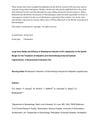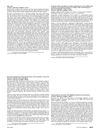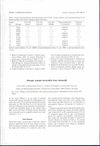 5 citations,
January 2019 in “Clinical Drug Investigation”
5 citations,
January 2019 in “Clinical Drug Investigation” Some off-label treatments increase hair density, but long-term safety unknown.
 122 citations,
November 1984 in “Journal of the American Academy of Dermatology”
122 citations,
November 1984 in “Journal of the American Academy of Dermatology” No single treatment is consistently effective for alopecia areata, and more research is needed.
 104 citations,
August 2008 in “Clinics in Dermatology”
104 citations,
August 2008 in “Clinics in Dermatology” Treating psoriasis on the scalp, nails, and skin folds is challenging, often requiring systemic treatments for severe cases, with some success in topical and biologic treatments.
 37 citations,
February 2014 in “Journal of Dermatology”
37 citations,
February 2014 in “Journal of Dermatology” Valproic acid increases hair count in men with hair loss.
 26 citations,
January 2019 in “Expert Opinion on Investigational Drugs”
26 citations,
January 2019 in “Expert Opinion on Investigational Drugs” New treatments for hair loss show promise, but more research is needed to confirm their safety and effectiveness.
 26 citations,
September 2018 in “Neurobiology of Disease”
26 citations,
September 2018 in “Neurobiology of Disease” Finasteride and dutasteride reduce unwanted movements from Parkinson's disease treatment by normalizing certain brain signals.
 22 citations,
December 2017 in “International Journal of Molecular Sciences”
22 citations,
December 2017 in “International Journal of Molecular Sciences” Minoxidil boosts hair growth by increasing blood flow and nutrients to hair follicles.
 15 citations,
January 2017 in “Experimental Neurology”
15 citations,
January 2017 in “Experimental Neurology” Finasteride reduces movement issues in Parkinson's disease rats.
 14 citations,
October 2016 in “Psychoneuroendocrinology”
14 citations,
October 2016 in “Psychoneuroendocrinology” Finasteride affects brain processes related to neurotransmission and metabolism, potentially helping with neuropsychiatric conditions.
 14 citations,
August 2007 in “Bioorganic & Medicinal Chemistry Letters”
14 citations,
August 2007 in “Bioorganic & Medicinal Chemistry Letters” The compound (1R,2S)-4-(2-Cyano-cyclohexyl-oxy)-2-trifluoromethyl-benzonitrile can stimulate hair growth and reduce oil production when applied topically.
 12 citations,
January 2008 in “Drugs”
12 citations,
January 2008 in “Drugs” Some topical treatments like corticosteroids and vitamin D analogues are effective for scalp psoriasis, but more long-term data is needed.
 12 citations,
May 1995 in “Australasian Journal of Dermatology”
12 citations,
May 1995 in “Australasian Journal of Dermatology” Hair loss in women can be slowed with treatment, but more research needed for better solutions.
 4 citations,
September 2012 in “Journal of dermatological science”
4 citations,
September 2012 in “Journal of dermatological science” The hair follicle's connective tissue is a key source of a certain collagen in human scalp skin.

Modern hair restoration techniques can effectively treat hair loss and provide natural-looking results.
 August 2001 in “Veterinary Dermatology”
August 2001 in “Veterinary Dermatology” The meeting presented findings on effective treatments for various pet skin conditions and insights into the immune responses of dogs with atopic dermatitis.
1 citations,
April 2022 in “Journal of Ayurveda and integrative medicine” Blumea eriantha DC extract shows strong potential for promoting hair growth.
 5 citations,
June 2012 in “Journal of Cosmetic and Laser Therapy”
5 citations,
June 2012 in “Journal of Cosmetic and Laser Therapy” Finasteride and intense pulsed light effectively reduce unwanted facial hair in women, but may not be cost-effective.
December 2012 in “http://isrctn.org/>” 7 citations,
June 2000 in “Journal of the American Academy of Dermatology” Foam corticosteroid covers as well as traditional forms.
 30 citations,
December 1972 in “Archives of dermatology”
30 citations,
December 1972 in “Archives of dermatology” The steroid solution can regrow hair but often causes skin issues and doesn't work long-term.
 June 1992 in “Inpharma Weekly”
June 1992 in “Inpharma Weekly” Patch testing with different solvents helps find the right minoxidil formulation for those with scalp allergies.
1 citations,
December 1995 in “Archives of Dermatology” The combination of topical minoxidil and oral finasteride improved hair regrowth in a man with advanced hair loss.
 14 citations,
April 2018 in “ACS Biomaterials Science & Engineering”
14 citations,
April 2018 in “ACS Biomaterials Science & Engineering” Nanoemulsion is a promising method for delivering luteolin to promote hair growth without minoxidil's side effects.
 38 citations,
October 2014 in “British journal of dermatology/British journal of dermatology, Supplement”
38 citations,
October 2014 in “British journal of dermatology/British journal of dermatology, Supplement” Bimatoprost solution is effective and safe for long-term use in treating eyelash thinning.
 23 citations,
April 1991 in “Journal of The American Academy of Dermatology”
23 citations,
April 1991 in “Journal of The American Academy of Dermatology” Minoxidil solution can cause skin irritation and allergies in some users.
 2 citations,
February 2016 in “British Journal of Dermatology”
2 citations,
February 2016 in “British Journal of Dermatology” Bimatoprost solution 0.03% is effective for treating sparse eyelashes.
 March 2012 in “Journal of The American Academy of Dermatology”
March 2012 in “Journal of The American Academy of Dermatology” Latisse is safe and effective for long-term eyelash growth in people with thin eyelashes from chemotherapy or unknown causes.
 September 2022 in “Journal of pharmaceutical sciences”
September 2022 in “Journal of pharmaceutical sciences” Thicker minoxidil solutions work better and need less frequent application.
 January 2022 in “Experimental Dermatology”
January 2022 in “Experimental Dermatology” Minoxidil solution and foam both increase hair growth, but the solution works better than the foam.
 9 citations,
January 1992 in “Contact Dermatitis”
9 citations,
January 1992 in “Contact Dermatitis” Some people using minoxidil for hair loss developed an allergic skin reaction, often related to an ingredient that helps minoxidil work better.


























